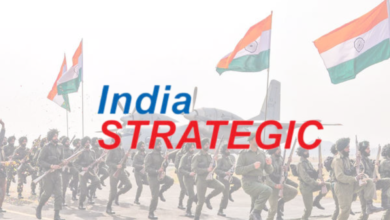IAF Poised for New Combat Aircraft
 The Indian Air Force has finally got the deal for new combat aircraft, and the one it selected as its choice after a rigorous process. The number of Rafale jets contracted with France though is small, just 36 or two squadrons if one considers the obsolescence factor that is fast depleting IAF’s numerical strength.
The Indian Air Force has finally got the deal for new combat aircraft, and the one it selected as its choice after a rigorous process. The number of Rafale jets contracted with France though is small, just 36 or two squadrons if one considers the obsolescence factor that is fast depleting IAF’s numerical strength.
Nonetheless, the Government’s decision to conclude the Rafale deal in about 18 months after the eight-year long MMRCA competition for 126 (plus 63 options) was scrapped is encouraging, particularly as the Ministry of Defence has mostly been in a state of paralysis post the acquisition of Bofors, which drew allegations of poor quality and bribes from politicians and media.
Prime Minister Narendra Modi, who had personally steered the deal with French President Francois Hollande, deserves kudos, and diplomatically, the deal calls for bilateral congratulations and champagne the way the French are celebrating.
For IAF, it’s literally a new beginning in this millennium, as most of its MiG series of aircraft as well as the French Mirage and Anglo-French Jaguars are of the 1970s and 1980s generation. The Air Dominance Su-30 MKI, which was contracted in 1996 with Russia, is being made in India and although its onboard systems are updated regularly, the overall availability of the aircraft is just about 50-plus per cent.
In the case of Rafale, there is a very important guarantee clause to assure its availability at 75 per cent at any given time.
A smiling Chief of the Air Staff, Air Chief Marshal Arup Raha, told India Strategic that the Government is favourably considering to set up a second aircraft manufacturing line under Make in India projects (in addition to that of LCA at HAL). Besides the US Boeing F/A-18 Super Hornet and Lockheed Martin F-16 Super Viper (Block 70), and Swedish Saab Gripen NG, he added, IAF is open for projects for Rafale and Eurofighter also but only under Make in India programmes.
Many foreign companies operating in India say that while they want to do business, the uncertainties over timelines in decision making are deterring, and officers in the MoD keep passing on files to one another without recording conclusive points.
This complaint often comes from the armed forces also, who have to change specifications if, for instance, there is no decision for long for a certain item, and during the years of consideration, new technologies come in.
The Prime Minister had laid down Skill, Scale and Speed as the requirement for the country’s economic development after taking over the reins of the country a couple of years ago. He needs to assure serving and retired bureaucrats, and military officials involved in selection of various weapons and systems, that the Government will pay no heed to the curse of allegations, most of which stem from competing interests and their paid agents.
The country has suffered enough, and the armed forces, Army, Navy, Air Force as well as paramilitary organisations urgently need new weapons and systems.
Their job is to deter an enemy or delete him; they must be empowered with what they ask for. Ensuring competition and speed in decision making will do wonders for creating a modern defence industrial infrastructure.
Gulshan Rai Luthra




